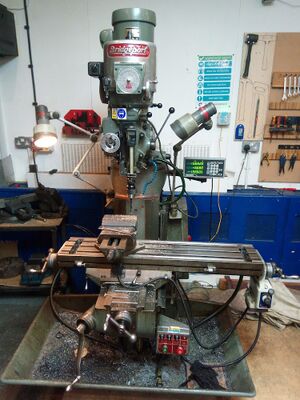Bridgeport Mill
A milling machine used for many kinds of metal cutting & shaping tasks
| Metal Milling Machine (Bridgeport) | |
|---|---|
 | |
| Sub-category | Metalworking |
| Status | Good working order |
| Last updated | 1 February 2026 23:30:46 |
| Training requirement | yes |
| Training link | Bridgeport Mill Training |
| ACnode | yes |
| Owner | LHS |
| Location | Metalworking Shop |
| Maintainers | Machine Shop Team, Toby Molyneux, Liam, Tim Jacobs |
ACnoded
Training Required
Powered up and commissioned.
If you would like to receive training on the mill please add yourself to this list. Note the page might not be actively monitored by the trainers, so also make yourself known to other metalshop users. Watch the required prerequisite training as listed on the metal work group page. you need to understand the terminology, process's and get hand on (both are critical) if you dont watch them you are wasting everyone's time.
Bring your material and drawings in and discuss your project with a machine shop maintainer.
Be prepared to invest significant time and effort into mastering the required skill.
Please note the mill is suitable for metal only - no wood
Shares coolant product with the metal lathe, for coolant details see Colchester Master Lathe
Risk Assessment - Metal Milling Machines
This risk assessment is intended to provide guidance on the risk associated with the above equipment and activities in normal use. Please also check general risk assessments for the space as a whole. Any discrepancies, errors or concerns should be raised with the document maintainers or trustees - do not edit this assessment directly. For responsible persons and last update, see 'version log' of the assessment page.
Activity
Cutting metal or suitable plastics on the metal mill
Signage
Understanding Risk Rating
LOW - Ensure current control measures are in place and continue with activity
MED - Control measures may be adequate, co-supervision is recommended
HIGH - Do not undertake activity without further consultation with area specialists
Risk Assessment
| Identify Hazards | Who May be Harmed and How | Severity | Control Measures | Likelihood | Risk Rating |
|---|---|---|---|---|---|
| Incompetent user | User, Bystander | HIGH | Users must not use tools that they are not competent to use. Members must challenge use that they believe is dangerous. All members wishing to use the mill must be trained. Users must read the risk assessment before using a tool. | LOW | MED |
| Contact with cutter | User | HIGH | Do not touch moving parts of machine once in use. Do not put hands behind the guard –If swarf removal is needed use a brush. Mill should be switched off immediately after use. Do Not Wear Gloves or loose clothing when operating the machine. Tie long hair back when operating the machine | LOW | MED |
| Ejection of workpiece (Kickback) | User of the tool, users of the room, the space. | HIGH | Use a machine vice where possible. Make sure the part is secured in the vice or to the table before starting acut. Cuts should not exceed recommended cutting depth or feed. Parts attached directly to the bed must be securely clamped. The vice or other workholding jigs must be attached securely to the bed. Other users of the room should not be close to the machine. The machine should be used with it’s guard attached, when possible. Support for parts, in the form of parallels, centres, jacks, etc, should be used where appropriate. | LOW | MED |
| Cutter | User of the tool, users of the room, the space. | LOW | Do not exceed the recommended feed and speed settings of the mill. Do not exceed recommended cutting depths. Make sure that your material is free from foreign objects. Do not make a cut that exceeds your material depth. Ensure cutter is sharp before use. Side-cutting tools are not to be held in a Jacobs chuck. The machine should be used with it’s guard attached, when possible | MED | LOW |
| Noise | User of the tool, users of the room. | LOW | Ear protection is advised, particularly on harder materials | LOW | LOW |
| Flying | User of the tool, users of the room. | MED | Eye protection must be worn whilstusing the mill. Eye protection must be worn by all users of the workshop. Do not exceed the recommended feed and speed settings on the mill. Do not exceed recommended cutting depths. Make sure that your material is free from foreign objects. Do not make a cut that exceeds your material depth. Ensure cutters are sharp before use. Ensure the drawbar is tight before starting the machine. The machine should be used with it’s guard attached, when possible | MED | MED |